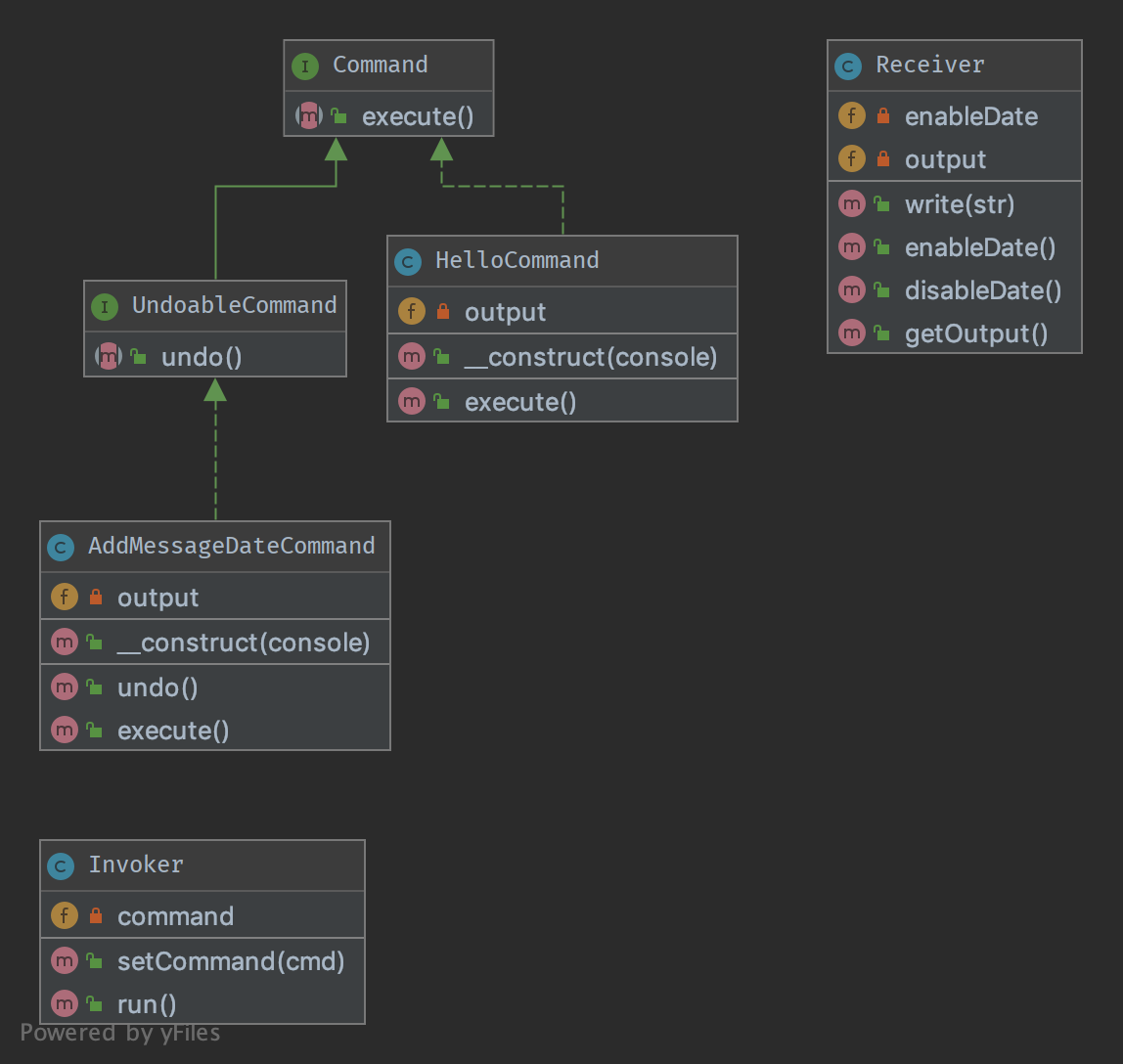3.2. Commando
3.2.1. Doel
Om aanroep en ontkoppeling samen te vatten.
We hebben een Starter en een Ontvanger. Dit patroon gebruikt een “Commando” om de methodeaanroep aan de ontvanger te delegeren en presenteert dezelfde methode “execute”. Daarom weet de Starter gewoon “voer uit” aan te roepen om het commando van de client te verwerken. De Ontvanger is losgekoppeld van de Starter.
Het tweede aspect van dit patroon is de undo (), die de methode execute () ongedaan maakt. Commando’s kunnen ook worden geaggregeerd om complexere commando’s te combineren met een minimum aan kopiëren en plakken en vertrouwen op compositie boven overerving.
3.2.2. Bijvoorbeeld
A text editor : all events are commands which can be undone, stacked and saved.
grote console tools maken gebruik van subcommandos om verschillende taken uit te delen en ze verpakken in “modules”, elk van deze kan worden gebruikt met de Commando patroon (vb. zwervend)
3.2.3. UML Diagram

3.2.4. Code
Je kan deze broncode terugvinden op GitHub
Command.php
1<?php
2
3declare(strict_types=1);
4
5namespace DesignPatterns\Behavioral\Command;
6
7interface Command
8{
9 /**
10 * this is the most important method in the Command pattern,
11 * The Receiver goes in the constructor.
12 */
13 public function execute();
14}
UndoableCommand.php
1<?php
2
3declare(strict_types=1);
4
5namespace DesignPatterns\Behavioral\Command;
6
7interface UndoableCommand extends Command
8{
9 /**
10 * This method is used to undo change made by command execution
11 */
12 public function undo();
13}
HelloCommand.php
1<?php
2
3declare(strict_types=1);
4
5namespace DesignPatterns\Behavioral\Command;
6
7/**
8 * This concrete command calls "print" on the Receiver, but an external
9 * invoker just knows that it can call "execute"
10 */
11class HelloCommand implements Command
12{
13 /**
14 * Each concrete command is built with different receivers.
15 * There can be one, many or completely no receivers, but there can be other commands in the parameters
16 */
17 public function __construct(private Receiver $output)
18 {
19 }
20
21 /**
22 * execute and output "Hello World".
23 */
24 public function execute()
25 {
26 // sometimes, there is no receiver and this is the command which does all the work
27 $this->output->write('Hello World');
28 }
29}
AddMessageDateCommand.php
1<?php
2
3declare(strict_types=1);
4
5namespace DesignPatterns\Behavioral\Command;
6
7/**
8 * This concrete command tweaks receiver to add current date to messages
9 * invoker just knows that it can call "execute"
10 */
11class AddMessageDateCommand implements UndoableCommand
12{
13 /**
14 * Each concrete command is built with different receivers.
15 * There can be one, many or completely no receivers, but there can be other commands in the parameters.
16 */
17 public function __construct(private Receiver $output)
18 {
19 }
20
21 /**
22 * Execute and make receiver to enable displaying messages date.
23 */
24 public function execute()
25 {
26 // sometimes, there is no receiver and this is the command which
27 // does all the work
28 $this->output->enableDate();
29 }
30
31 /**
32 * Undo the command and make receiver to disable displaying messages date.
33 */
34 public function undo()
35 {
36 // sometimes, there is no receiver and this is the command which
37 // does all the work
38 $this->output->disableDate();
39 }
40}
Receiver.php
1<?php
2
3declare(strict_types=1);
4
5namespace DesignPatterns\Behavioral\Command;
6
7/**
8 * Receiver is a specific service with its own contract and can be only concrete.
9 */
10class Receiver
11{
12 private bool $enableDate = false;
13
14 /**
15 * @var string[]
16 */
17 private array $output = [];
18
19 public function write(string $str)
20 {
21 if ($this->enableDate) {
22 $str .= ' [' . date('Y-m-d') . ']';
23 }
24
25 $this->output[] = $str;
26 }
27
28 public function getOutput(): string
29 {
30 return join("\n", $this->output);
31 }
32
33 /**
34 * Enable receiver to display message date
35 */
36 public function enableDate()
37 {
38 $this->enableDate = true;
39 }
40
41 /**
42 * Disable receiver to display message date
43 */
44 public function disableDate()
45 {
46 $this->enableDate = false;
47 }
48}
Invoker.php
1<?php
2
3declare(strict_types=1);
4
5namespace DesignPatterns\Behavioral\Command;
6
7/**
8 * Invoker is using the command given to it.
9 * Example : an Application in SF2.
10 */
11class Invoker
12{
13 private Command $command;
14
15 /**
16 * in the invoker we find this kind of method for subscribing the command
17 * There can be also a stack, a list, a fixed set ...
18 */
19 public function setCommand(Command $cmd)
20 {
21 $this->command = $cmd;
22 }
23
24 /**
25 * executes the command; the invoker is the same whatever is the command
26 */
27 public function run()
28 {
29 $this->command->execute();
30 }
31}
3.2.5. Теst
Tests/CommandTest.php
1<?php
2
3declare(strict_types=1);
4
5namespace DesignPatterns\Behavioral\Command\Tests;
6
7use DesignPatterns\Behavioral\Command\HelloCommand;
8use DesignPatterns\Behavioral\Command\Invoker;
9use DesignPatterns\Behavioral\Command\Receiver;
10use PHPUnit\Framework\TestCase;
11
12class CommandTest extends TestCase
13{
14 public function testInvocation()
15 {
16 $invoker = new Invoker();
17 $receiver = new Receiver();
18
19 $invoker->setCommand(new HelloCommand($receiver));
20 $invoker->run();
21 $this->assertSame('Hello World', $receiver->getOutput());
22 }
23}
Tests/UndoableCommandTest.php
1<?php
2
3declare(strict_types=1);
4
5namespace DesignPatterns\Behavioral\Command\Tests;
6
7use DesignPatterns\Behavioral\Command\AddMessageDateCommand;
8use DesignPatterns\Behavioral\Command\HelloCommand;
9use DesignPatterns\Behavioral\Command\Invoker;
10use DesignPatterns\Behavioral\Command\Receiver;
11use PHPUnit\Framework\TestCase;
12
13class UndoableCommandTest extends TestCase
14{
15 public function testInvocation()
16 {
17 $invoker = new Invoker();
18 $receiver = new Receiver();
19
20 $invoker->setCommand(new HelloCommand($receiver));
21 $invoker->run();
22 $this->assertSame('Hello World', $receiver->getOutput());
23
24 $messageDateCommand = new AddMessageDateCommand($receiver);
25 $messageDateCommand->execute();
26
27 $invoker->run();
28 $this->assertSame("Hello World\nHello World [" . date('Y-m-d') . ']', $receiver->getOutput());
29
30 $messageDateCommand->undo();
31
32 $invoker->run();
33 $this->assertSame("Hello World\nHello World [" . date('Y-m-d') . "]\nHello World", $receiver->getOutput());
34 }
35}